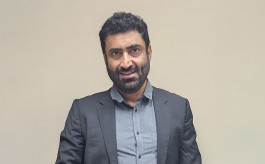Organic Mandya: Getting Back To Roots
By Vinutha Vidyasagar | July 16, 2018
Madhu Chandan, an ex-IT professional who now proudly calls himself a farmer, created a movement in Mandya district, Karnataka – to set farmers debt free and spearhead chemical-free farming. It was achieved by setting up Organic Mandya in collaboration with Mandya Organic Farmers Co-Operative Society. In a chat with Point-of-Purchase, Madhu Chandan, Founder, Organic Mandya explains how it provides assistance to organic farmers to sell their farm produce and solve their farming-related problems. Organic
 You were IT professional who worked in different countries and also an IT entrepreneur. What triggered you to shift focus towards organic farming?
You were IT professional who worked in different countries and also an IT entrepreneur. What triggered you to shift focus towards organic farming?
After my engineering in IT, I seized opportunities in eminent firms around the globe. Although I was successful in my profession, I remained a farmer at heart, which was coupled with a desire to give back to people of my native, Mandya. At the same time, the situation of farmers in our district was heartrending with health and financial crisis. I always pondered on our ancestral farmers who lead healthy and wealthy lives. Incidentally, I realised that there is no better time than the present period for organic produce owing to the health consciousness among people.
 We had a two-thronged opportunity to enter into organic farming. Fortunately, I had a backing of 13 investors and that’s how Organic Mandya came into existence in 2015. We wanted to stop mass migration of youth segment in Mandya that was settling for menial jobs in urban cities. We started to educate them to focus on the most valued job – agriculture. Organic Mandya now uplifts the economic status of marginal farmers, ensuring them the best prices available for their organic products.
We had a two-thronged opportunity to enter into organic farming. Fortunately, I had a backing of 13 investors and that’s how Organic Mandya came into existence in 2015. We wanted to stop mass migration of youth segment in Mandya that was settling for menial jobs in urban cities. We started to educate them to focus on the most valued job – agriculture. Organic Mandya now uplifts the economic status of marginal farmers, ensuring them the best prices available for their organic products.
Owing to the transition from IT to agriculture, how did you adapt to farming?
Initially people were reluctant to the idea and I led them by  example. I had no knowledge of either agriculture or farming, however, I had the lineage of farming; my father was a vice chancellor in GKVK, Mysore. I used my own land to grow pulses, cereals, vegetables and fruits using no chemical fertilisers. I showed them that chemical-free ways can be profitable. We don’t give any technical knowledge to our farmers; farming is an instinct. We have been supporting that by instilling confidence and introducing them to the upcoming market of organic products.
example. I had no knowledge of either agriculture or farming, however, I had the lineage of farming; my father was a vice chancellor in GKVK, Mysore. I used my own land to grow pulses, cereals, vegetables and fruits using no chemical fertilisers. I showed them that chemical-free ways can be profitable. We don’t give any technical knowledge to our farmers; farming is an instinct. We have been supporting that by instilling confidence and introducing them to the upcoming market of organic products.
Besides uplifting the status of farmers, our motive was to make soil healthier for sustainable farming. Growing chemical-free agricultural products is not rocket science. Our ancestors have used traditional methods to yield good produce. With an intention to give impetus to modern methods, our traditional and successful methods have been discarded; the soil in our agricultural land has been infused with chemicals.
We needed to reverse the condition by adopting certain traditional methods such as cow-based farming; wherein instead of urea, we use cow dung and cow urine. We use other natural ingredients such as jaggery and dicot powder. We got more consistent results in organic farming over chemical farming. By way of these, we plan to make Mandya a chemical free district by 2020.
What is the product range offered by Organic Mandya? How do you think the market is opening up to organic products?
Our product segment spans from cereals, pulses, fruits, vegetables, native breed cow milk (A2 Milk) and their products, soaps and personal care products that are pure and chemical free. Organic segment impacts your health mind and body in a very positive way. Earlier, organic products were confined to economically sound consumer category as they were unaffordable to every segment of people. By diluting the entry of middlemen and procuring the produce in bulk, we have come up with reasonable pricing. Thus we are able to cater to all segments in the society. In Mandya, we have consumers who consume only organic products and they are successfully cured of diabetes and weight issues. It’s a tier III city, yet we do a business of Rs 15 lakh a month.
Demand for organic products is still in its nascent stage. What are your plans to reach out wider?
Awareness about organic food is 2-3% in rural, 8-10% in urban and overall India it is less than 1% and hence it’s a huge market to tap. Organic farmers and retailers also should get in creating organic food revolution.
Our first launch was an Integrated Organic Zone on Bangalore–Mysore highway between Mandya–Maddur towns. It is a one-stop for all organic needs. It is an organic super market, organic vegetable market, organic green market, organic oil extraction mill, organic gardening market and organic awareness centre. By the end of 2018, we aim to have around 10 exclusive stores/supermarkets for organic products. We will enter the US market soon and we have tied up with an Indian natural store in Dallas. Through our distribution model, Organic Mandya will reach out to California, Texas, New Jersey and Georgia. Within the first year of operation, Organic Mandya marked revenue of Rs 1.4 crore. In the fiscal, 2018-19, we have an outlook of Rs 20 crore as revenue.










Comments